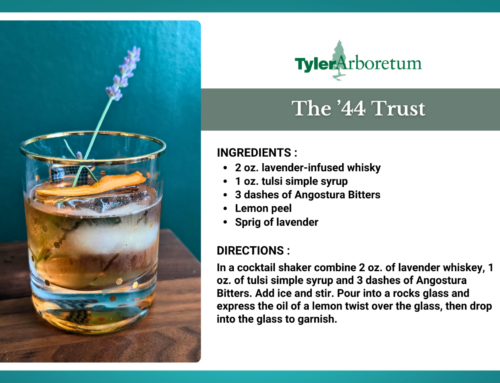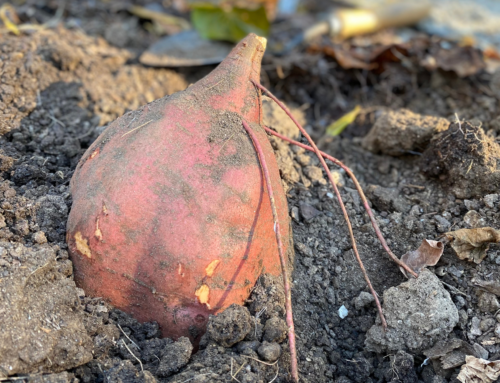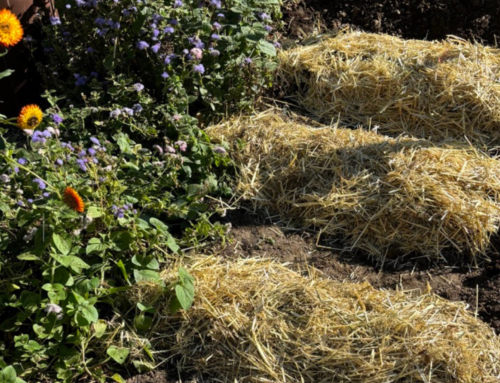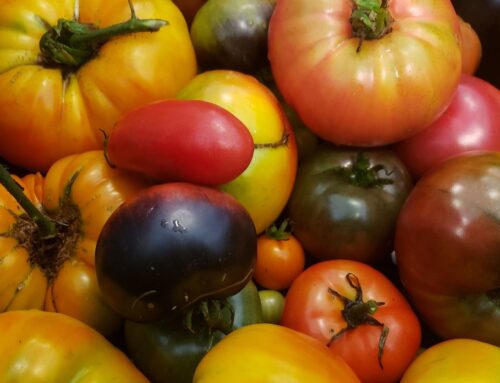Almost every day at Tyler, we have volunteers who help us maintain our grounds, grow vegetables, collect data, share expertise with visitors and much, much more. As a nonprofit organization, we understand and value the desire to affect real change in our community. One could say that service makes all the difference and that it is the greatest calling.
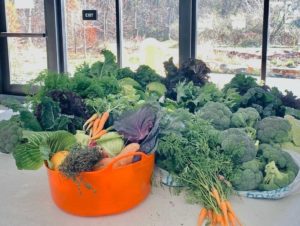
Even before the pandemic, Tyler had donated food to the Media Food Bank on a weekly basis when we had surplus produce not used in our programming. We knew that fresh vegetables were highly sought after at the Food Bank. The pandemic quickly changed everything and made what we donated more important. Economic instability in our community has increased the number of people living with food insecurity. I wanted to find out how important the food has become.
In 2020, I sat down with Paul Mickle, one of the Directors at the Media Food Bank. Paul is also their Distribution Coordinator. Part of his job is to coordinate donations and also assist people in getting food. Paul tells me that the Media Food Bank “Used to serve the western third of Delaware County (prior to the pandemic). Now as part of crisis intervention, anyone living in Delaware County can come as geographical regions were no longer barriers.” Paul discovered quickly just how much need was out there. Before the pandemic, the Media Food Bank served 40 to 60 families once a week on Thursdays and once a month on Sundays. Now, the organization is serving over 100 families twice weekly. Families are coming from many parts of the county. Some were already in need before the pandemic and with the crisis, many more joined them. According to Feeding America (a non profit dedicated to end hunger in America), “Due to the coronavirus pandemic, 50 million people may face hunger in the U.S. during 2020 — including more than 17 million children. Hunger knows no boundaries — it touches every community in the U.S.”
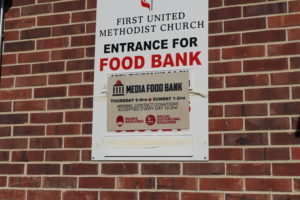
Fortunately, as the need for food rose, so did the generosity of the community. From schools to businesses including folks from the Media Farmer’s Market, food and supplies arrived and kept on coming. Volunteers also set up pick up runs at different businesses, easing transportation challenges. Residents of the newly built apartments across the street started a vegetable garden on the grounds of the Methodist church which houses the Food Bank. They named it Bud’s Garden. This was not the first year, but according to Paul, it was certainly productive because more people had time to garden. Bud’s Garden, tended by the residents, provided produce all the way until the first week of December. There were several heads of broccoli ready for someone to take home when I visited.
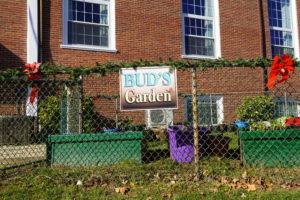
During my visit, I noticed a bevy of activities in the parking lot as several groups of people offloaded canned and boxed goods. I met up with Jane Ferry, who volunteers at the Food Bank (since 2012) and at Tyler Arboretum (since 2010). She was in a room where volunteers were sorting toiletries, laundry detergent and soap along with the baked goods, baby food and fresh vegetables. Jane’s main job is to sort through the personal items as well as pet food and diapers. When a large container of goods comes in, Jane re-allocates it into a weekly amount for families. Prior to the pandemic, people could come in and make their selections. Now they fill out a form and volunteers make their boxes for them. Distributions are now in the parking lot. Anyone can donate food. Drop-offs to the Media Food Bank (350 W State St, Media, PA 19063) are received daily from 12 to 2pm. Drive to the back of the church. No appointments needed.
Although donations keep coming, most fresh food can be hard to come by. “Fresh vegetables are the first to be cut out when funds are low. Most people fall back on canned goods to get them through,” Paul remarked. Having local produce, especially at this time of year is a luxury. Tyler is among the few donors of fresh and diverse vegetables during the winter, and people look forward to the offerings. Thanks to strong community support, the Media Food Bank has earned a reputation for offering a diversity of vegetables, food stuffs, toiletries and household supplies from which people can choose. According to Paul, that’s part of the reason why they come.
Still, one of the greatest challenges for the Food Bank is assisting people who are reluctant to ask for help. Food insecurity is a complex issue, and there is a long history of stigma attached to the act of reaching out. But it should not be that way. Not all people living in poverty have food insecurities. Not all food insecure people live in poverty. You might never know that someone is struggling to put food on their table. Hunger can look like so many things. It could be a person working hard to live from paycheck to paycheck. It might be a student, choosing between tuition and groceries. It could be someone living in a neighborhood without easy access to a grocery store. It might be your neighbor who recently suffered a medical crisis and is struggling to pay the bills. Food insecurity can look like anyone in our community, and the pandemic has only put more people at risk.
Paul tells me that many of the people resist coming in for themselves. They don’t want their friends and neighbors to know they are in need. The situation has been compounded by the fact that the lines are much longer and are outdoors as mandated by COVID 19 regulations. Anonymity is no longer possible unless private appointments are made. When they come in for their visit they realize that Paul is a “cool dude,” and that they are sent home with food and supplies for the family so they can survive.
I started this article with the question of how the food grown in Lucille’s Garden made a difference in the community this year. Measuring from August until December we’ve donated just over 900 pounds of food. And that is a tremendous amount of fresh produce. But what I found at the Food Bank goes beyond what we donated. I found that we are just one piece of the puzzle, and that everyone — every action and every opportunity when taken — makes a difference. The need is so much greater now, and will be perhaps for a long time while the economy recovers. The vegetables donated by Tyler are one part of a greater community effort to answer the call – in service to others.
If you or anyone you know needs food, please call (484) 442-0033, or pick up food on Thursdays (6 to 8pm) and Sundays (1 to 2pm).
Tyler will be hosting a food drive from January 17– 31 when donations to the foodbank are usually low. Please drop your contributions at the Visitor Center during business hours. Items Paul and Jane recommend:
- Rice
- cooking oil
- boxed milk
- powdered milk
- Mayonnaise
- Ketchup
- Mustard
- Vinegar
- Honey
- Dry Beans
- Canned Salmon
- Sardines
- Spam
- Chicken/Beef Broth
- Salad Dressing
- Ground Coffee
- Hot Cocoa Packets
- Kid Snacks
- Diapers
- Wipes
- Tampon/Pads
- Toiletry Items
Personal products such as toiletries, detergents, feminine hygiene and diapers are always welcome.



